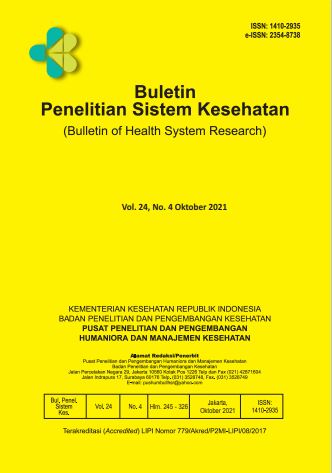Persepsi Mahasiswa UIN Walisongo Terhadap Covid-19 Dan Perilaku Kesehatan
Abstract
Covid-19 is a disease caused by the coronavirus. Since the end of 2019, WHO has reported cases of pneumonia that occurred in Wuhan, Tiongkok, which then spread to several countries including Indonesia. The number of the spread of Covid-19 is increasing day by day, the government continues to try to break the chain of the spread of Covid-19. The success of efforts to break the Covid-19 chain depends on the public's knowledge and perception of Covid-19 and its prevention efforts. This study aims to determine the perceptions and behavior of UIN Walisongo students in preventing Covid-19. This study used a quantitative descriptive research method, with a data collection instrumen in the form of a questionnaire. Data collection techniques using a google form questionnaire with 10 statements and opinions from UIN Walisongo students. The study population was all students of UIN Walisongo Semarang and as a sample were 302 students from various faculties who were selected by nonprobability sampling. The results showed 86.49% of the students of UIN Walisongo have a "very good" perception of Covid-19. Healthy behaviors carried out by UIN Walisongo students as an effort to prevent Covid-19 include: washing hands, using masks, social distancing, taking vitamins and exercising. To increase the prevention of Covid-19, it is necessary to conduct health education directly or online through social media to communicate with the public.
Abstrak
Covid-19 merupakan penyakit yang disebabkan oleh virus corona. Pada akhir tahun 2019, WHO melaporkan kasus pneumonia yang terjadi di Wuhan, Tiongkok yang kemudian menyebar di beberapa negara termasuk Indonesia. Angka penyebaran Covid-19 semakin hari kian meningkat, pemerintah terus berupaya memutus rantai penyebaran Covid-19. Keberhasilan upaya pemutusan rantai Covid-19 tergantung dari pengetahuan dan persepsi masyarakat terhadap Covid-19 serta upaya pencegahannya. Penelitian ini bertujuan untuk mengetahui persepsi dan perilaku Mahasiswa UIN Walisongo dalam pencegahan Covid-19. Penelitian ini menggunakan metode penelitian deskriptif kuantitatif, dengan instrument pengumpulan data berupa kuesioner. Teknik pengumpulan data dengan menggunakan kuesioner google form dengan 10 pernyataan serta pendapat dari mahasiswa UIN Walisongo. Populasi penelitian adalah seluruh mahasiswa UIN Walisongo Semarang dan sebagai sampel adalah 302 mahasiswa dari berbagai fakultas yang dipilih dengan teknik nonprobability sampling. Hasil penelitian menunjukkan 86.49% mahasiswa UIN Walisongo mempunyai persepsi “sangat baik” terhadap Covid-19. Perilaku sehat yang dilakukan mahasiswa UIN Walisongo sebagai upaya pencegahan Covid-19 meliputi: cuci tangan, menggunakan masker, social distancing, mengonsumsi vitamin dan berolahraga. Untuk meningkatkan pencegahan Covid-19 perlu dilakukan penyuluhan kesehatan secara langsung atau online melalui media sosial untuk berkomunikasi dengan masyarakat.
References
Adliyani, Z. O. N. (2015). Pengaruh Perilaku Individu terhadap Hidup Sehat. Perubahan Perilaku Dan Konsep Diri Remaja Yang Sulit Bergaul Setelah Menjalani Pelatihan Keterampilan Sosial, 4(7), 109–114.
Effendi, D. E., & Muchammadun. (2018). “Happiness” in Bahasa Indonesia and its implication to health and community well-being. Asian EFL Journal, 20(8), 279–291.
Fehr, A. R., & Perlman, S. (2015). Chapter 1 Coronaviruses : An Overview of Their Replication and Pathogenesis, 1282(1). https://doi.org/10.1007/978-1-4939-2438-7
Ibnu, Y., & Setiawan, S. (2020). Penetapan Karantina Wilayah Menurut Pandangan Legal Positivisme Dalam Rangka Pencegahan dan Pemberantasan Pandemi Coronavirus Disease ( Covid ) -19. Penetapan Karantina Wilayah Menurut Pandangan Legal Positivisme Dalam Rangka Pencegahan Dan Pemberantasan Pandemi Coronavirus Disease (Covid)-19, 1–16. https://doi.org/10.31219/osf.io/zfg6x
Kissler, S., Tedijanto, C., Lipsitch, M., & Grad, Y. H. (2020). Social Distancing Strategis For Curbing the COVID-19 Epidemic. MedRxiv, (1).
Lai, A. L., Millet, J. K., Daniel, S., Freed, J. H., & Whittaker, G. R. (2020). Since January 2020 Elsevier has created a COVID-19 resource centre with free information in English and Mandarin on the novel coronavirus COVID- company ’ s public news and information website . Elsevier hereby grants permission to make all its COVID-19-r. The Lancet, 395(April), 1315.
Maugeri, G., Castrogiovanni, P., Battaglia, G., Pippi, R., D’Agata, V., Palma, A., … Musumeci, G. (2020). The impact of physical activity on psychological health during Covid-19 pandemic in Italy. Heliyon, 6(6), 1–8. https://doi.org/10.1016/j.heliyon.2020.e04315
Mulyati, B. (2020). Potensi Herbal dalam Pencegahan dan Penanganan Pasien Covid-19. INDEPT, 9(1).
Notoatmodjo. (2010). Ilmu Perilaku Kesehatan. Jakarta: Rineka Cipta.
Nurdin, N. (2021). ISOLASI MANDIRI DALAM ISLAM : Kritik Metodologis Fatwa LBM PWNU Jawa Tengah Tentang Anjuran Isolasi Saat Wabah. Journal of Islamic Law, 2(1), 1–21. https://doi.org/10.24260/jil.v
Ornell, F., Schuch, J. B., Sordi, A. O., Henrique, F., & Kessler, P. (2020). ’ ’ Ketakutan Pandemi ’ ’ dan COVID-19 : beban dan strategi kesehatan mental, 42(April), 232–235.
Samsuduhah, S. (2020). Maslahah Kebijakan Pencegahan Wabah Pandemi Covid-19 Dalam Islam. Al-Tafaqquh: Journal of Islamic Law, 1(2), 117. https://doi.org/10.33096/al-tafaqquh.v1i2.63
Sembiring, B. B. (2014). Minuman fungsional antioksidan berbasis tanaman obat. Prosiding Seminar Nasional Pertanian Organik, (3), 451–460.
Soekidjo, N. (2010). Metodologi Penelitian Kesehatan. Jakarta: Rineka Cipta.
Sugiyono. (2017). Metode Penelitian Kuantitatif, Kualitatif, dan R&D. Bandung: Alfabeta.
Syafrida, S. (2020). Bersama Melawan Virus Covid 19 di Indonesia. SALAM: Jurnal Sosial Dan Budaya Syar-I, 7(6). https://doi.org/10.15408/sjsbs.v7i6.15325
Timah, S. (2021). Hubungan Penyuluhan Kesehatan dengan Pencegahan covid 19 di Kelurahan Kleak Kecamatan Malalayang Kota Manado. Indonesian Journal of Community Dedication (IJCD), 3(1).
Van Leeuwen, C. M., Post, M. W., Westers, P., Van Der Woude, L. H., De Groot, S., Sluis, T., … Lindeman, E. (2012). Relationships between activities, participation, personal factors, mental health, and life satisfaction in persons with spinal cord injury. Archives of Physical Medicine and Rehabilitation, 93(1), 82–89. https://doi.org/10.1016/j.apmr.2011.07.203
Wang Z, Qiang W, & Ke H. (2020). A Handbook of 2019-nCoV Pneumonia Control and Prevebtion. China: Hubei Science and Technology Press.
Willy. (2021). Hubungan Pengetahuan, Persepsi, dan Sikap Masyarakat Dengan Perilaku Pencegahan Wabah Virus Corona. Skripsi, 1–80.
Yuliana. (2020). Corona virus diseases (Covid -19); Sebuah tinjauan literatur. Wellness and Healthy Magazine, 2(1), 187–192.
Zendrato, W. (2020). Gerakan Mencegah Daripada Mengobati Terhadap Pandemi Covid-19. Jurnal Education and Development, 8(2), 242–248.
Zhou, P., Yang, X. Lou, Wang, X. G., Hu, B., Zhang, L., Zhang, W., … Shi, Z. L. (2020). A pneumonia outbreak associated with a new coronavirus of probable bat origin. Nature, 579(7798), 270–273. https://doi.org/10.1038/s41586-020-2012-7
Satuan Tugas Covid-19. 2020. Memahami perilaku dan Informasi Tepat untuk Mencegah Penularan Covid-19 dalam https://www.covid19.go.id
World Health Organization (WHO). 2020. Coronavirus dalam https://www.who.int/health-topics/coronavirus. Published online: 2020 (Accessed 15 April 2020).
World Health Organization (WHO). 2020. Coronavirus dalam https://www.who.int/health-topics/coronavirus. Published online: 2020 (Accessed 16 Desember 2020).
Copyright (c) 2021 Buletin Penelitian Sistem Kesehatan

This work is licensed under a Creative Commons Attribution-ShareAlike 4.0 International License.


















